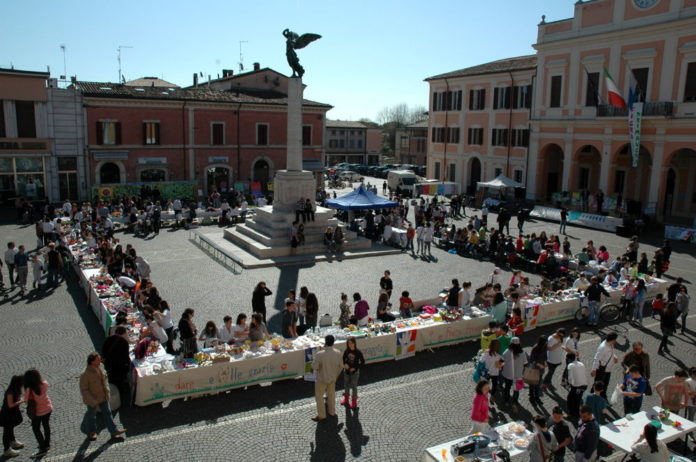
19 May 2017 | Focolare Worldwide
 “We asked the mayor of Savignano sul Rubicone to send a message of fraternity by adding some color to a public space,” say Matteo and Giosuè, Italian members of Youth for a United World. “They gave us an underpass connecting the main road to the train station. We created a mural where we wrote, next to the bridge that symbolizes the city, ‘Let’s bridge’ and “Global citizens” in a number of languages, with the help of a number of migrant kids who came through.” The result was a collective work, a visible sign of peace. The mural project was also an opportunity to make contact with the head of the Ravenna mosque, Imam Mustapha Soufi (president of the European Islamic Conference of Imams). After three months of work the underpass was inaugurated with two mayors and a member of European Parliament who, just three days after the terrible events in Brussels (this was March 2016), had asked to participate in this type of project, one promoted by kids that instils hope in a peaceful future. The underpass became a symbolic place. Matteo and Giosuè are both “ambassadors of peace,” an honorary title bestowed on them by Universal Circle of Ambassadors of Peace, headquartered in Geneva, which has the goal of spotlighting all those who work for peace, especially young people and children ages 6 to 18. For a number of years, they have organized a spring fair in their region, together with other young people. This is a Young for Unity project that, in collaboration with schools, associations and local governments, hopes to create activities promoting peace and fraternity. “Last July,” continues Matteo, “together with 50 members of Young for Unity, we went to World Youth Day. Pope Francis concluded his words with ‘May God bless your dreams.’ There are so many dreams that we want to achieve, especially to be builders of a world of peace and fraternity.” After an earthquake struck central Italy, they felt called once again. Among the many ideas was one to put on two dinners in Modena and Cesena to raise funds. “We got close to 100 kids involved and served 350 people at table, raising more than 4,000 Euros.” The dinner at Cesena included Imam Mustapha, who asked them to come and meet young Muslims to start on a path for peace at the Ravenna mosque, one of the four official mosques in Italy. They were warmly welcomed on January 22. They took off their shoes as they entered, and the girls covered their heads. They sat in a circle, girls to one side, boys to the other. “We started playing a quiz game on the Bible and Quran – there are so many things in common. We are not so different, and all of us wanted to build a more united world. At noon we stood up and, holding hands, we had a minute of silence to ask God for the gift of peace.” After a meal of cous cous prepared by the Muslim mothers, the group had a guided tour of the mosque and a moment of dialogue. “Peace is made by the young,” says the imam, “we must unite and change our way of thinking in order to bring down the walls of prejudice.” Their Muslim friends asked to be able to visit a Catholic church next. “It feels fantastic,” concludes Giosuè. “To build peace we need to respect each other and not be afraid of differences. How can we not think of those Muslim kids that we meet at school or perhaps come across on the street? They too are our brothers, builders of peace together with us, and not terrorists like the media wants us to believe.”
“We asked the mayor of Savignano sul Rubicone to send a message of fraternity by adding some color to a public space,” say Matteo and Giosuè, Italian members of Youth for a United World. “They gave us an underpass connecting the main road to the train station. We created a mural where we wrote, next to the bridge that symbolizes the city, ‘Let’s bridge’ and “Global citizens” in a number of languages, with the help of a number of migrant kids who came through.” The result was a collective work, a visible sign of peace. The mural project was also an opportunity to make contact with the head of the Ravenna mosque, Imam Mustapha Soufi (president of the European Islamic Conference of Imams). After three months of work the underpass was inaugurated with two mayors and a member of European Parliament who, just three days after the terrible events in Brussels (this was March 2016), had asked to participate in this type of project, one promoted by kids that instils hope in a peaceful future. The underpass became a symbolic place. Matteo and Giosuè are both “ambassadors of peace,” an honorary title bestowed on them by Universal Circle of Ambassadors of Peace, headquartered in Geneva, which has the goal of spotlighting all those who work for peace, especially young people and children ages 6 to 18. For a number of years, they have organized a spring fair in their region, together with other young people. This is a Young for Unity project that, in collaboration with schools, associations and local governments, hopes to create activities promoting peace and fraternity. “Last July,” continues Matteo, “together with 50 members of Young for Unity, we went to World Youth Day. Pope Francis concluded his words with ‘May God bless your dreams.’ There are so many dreams that we want to achieve, especially to be builders of a world of peace and fraternity.” After an earthquake struck central Italy, they felt called once again. Among the many ideas was one to put on two dinners in Modena and Cesena to raise funds. “We got close to 100 kids involved and served 350 people at table, raising more than 4,000 Euros.” The dinner at Cesena included Imam Mustapha, who asked them to come and meet young Muslims to start on a path for peace at the Ravenna mosque, one of the four official mosques in Italy. They were warmly welcomed on January 22. They took off their shoes as they entered, and the girls covered their heads. They sat in a circle, girls to one side, boys to the other. “We started playing a quiz game on the Bible and Quran – there are so many things in common. We are not so different, and all of us wanted to build a more united world. At noon we stood up and, holding hands, we had a minute of silence to ask God for the gift of peace.” After a meal of cous cous prepared by the Muslim mothers, the group had a guided tour of the mosque and a moment of dialogue. “Peace is made by the young,” says the imam, “we must unite and change our way of thinking in order to bring down the walls of prejudice.” Their Muslim friends asked to be able to visit a Catholic church next. “It feels fantastic,” concludes Giosuè. “To build peace we need to respect each other and not be afraid of differences. How can we not think of those Muslim kids that we meet at school or perhaps come across on the street? They too are our brothers, builders of peace together with us, and not terrorists like the media wants us to believe.”
![Celebrating a Europe of Hope in Malta]()
11 May 2017 | Focolare Worldwide
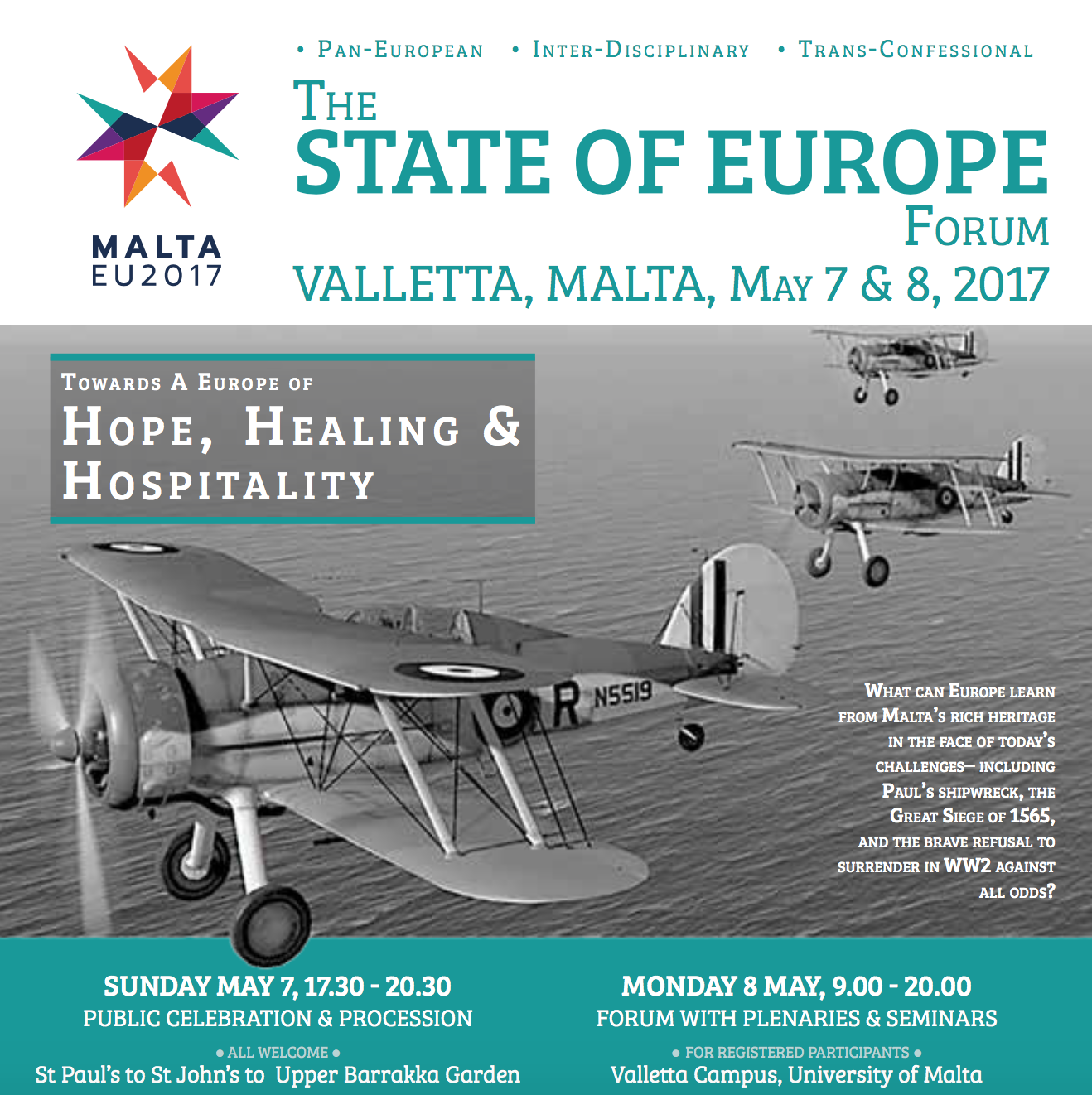 Malta is the largest island in the archipelago that shares its name. It is located in the central Mediterranean Sea between Sicily, Tunisia and Libya. It was the head of the Council of the European Union for the first time in its history in 2017. The island, whose symbol is the eight-cusped cross, signifying the eight Beatitudes, pertaining to the Knights of Malta, is closely situated to the tragedies that occur daily in the blue tomb that the Mediterranean Sea has become for those crossing between Africa, the Middle East and Europe in a desperate search for a new chance at life. On one of its other shores another shipwreck had found safe port after fourteen days adrift. One of the passengers was Saint Paul on his way back to Rome in around AD 60. According to tradition the ship carrying him and another 264 passengers was sunk by a storm, and everyone on board swam to shore. After some time he was invited to stay at the house of Publius, the Roman governor of the islands, whose father Paul cured of a serious flu. The governor converted to Christianity and became the first bishop of Malta. Europe’s Christian roots were the focus of discussion in Malta’s capital of Valletta on the 7th and 8th of May during a forum titled Towards a Europe of Hope, Healing and Hospitality. The goal of the forum, which is held each year by the European Union in the country of the presidency, is the promotion of dialogue according to the foundational inspiration of Robert Schuman. On the first day, after the opening events at the Anglican Cathedral, there was an artistic performance and a prayer titled “Hope”. Then a procession led through the streets of Valletta to the Roman Catholic Co-Cathedral of Saint John where some words were offered by Archbishop Scicluna and Maria Voce. The Focolare president offered a reflection on “Healing and Reconciliation”.
Malta is the largest island in the archipelago that shares its name. It is located in the central Mediterranean Sea between Sicily, Tunisia and Libya. It was the head of the Council of the European Union for the first time in its history in 2017. The island, whose symbol is the eight-cusped cross, signifying the eight Beatitudes, pertaining to the Knights of Malta, is closely situated to the tragedies that occur daily in the blue tomb that the Mediterranean Sea has become for those crossing between Africa, the Middle East and Europe in a desperate search for a new chance at life. On one of its other shores another shipwreck had found safe port after fourteen days adrift. One of the passengers was Saint Paul on his way back to Rome in around AD 60. According to tradition the ship carrying him and another 264 passengers was sunk by a storm, and everyone on board swam to shore. After some time he was invited to stay at the house of Publius, the Roman governor of the islands, whose father Paul cured of a serious flu. The governor converted to Christianity and became the first bishop of Malta. Europe’s Christian roots were the focus of discussion in Malta’s capital of Valletta on the 7th and 8th of May during a forum titled Towards a Europe of Hope, Healing and Hospitality. The goal of the forum, which is held each year by the European Union in the country of the presidency, is the promotion of dialogue according to the foundational inspiration of Robert Schuman. On the first day, after the opening events at the Anglican Cathedral, there was an artistic performance and a prayer titled “Hope”. Then a procession led through the streets of Valletta to the Roman Catholic Co-Cathedral of Saint John where some words were offered by Archbishop Scicluna and Maria Voce. The Focolare president offered a reflection on “Healing and Reconciliation”. 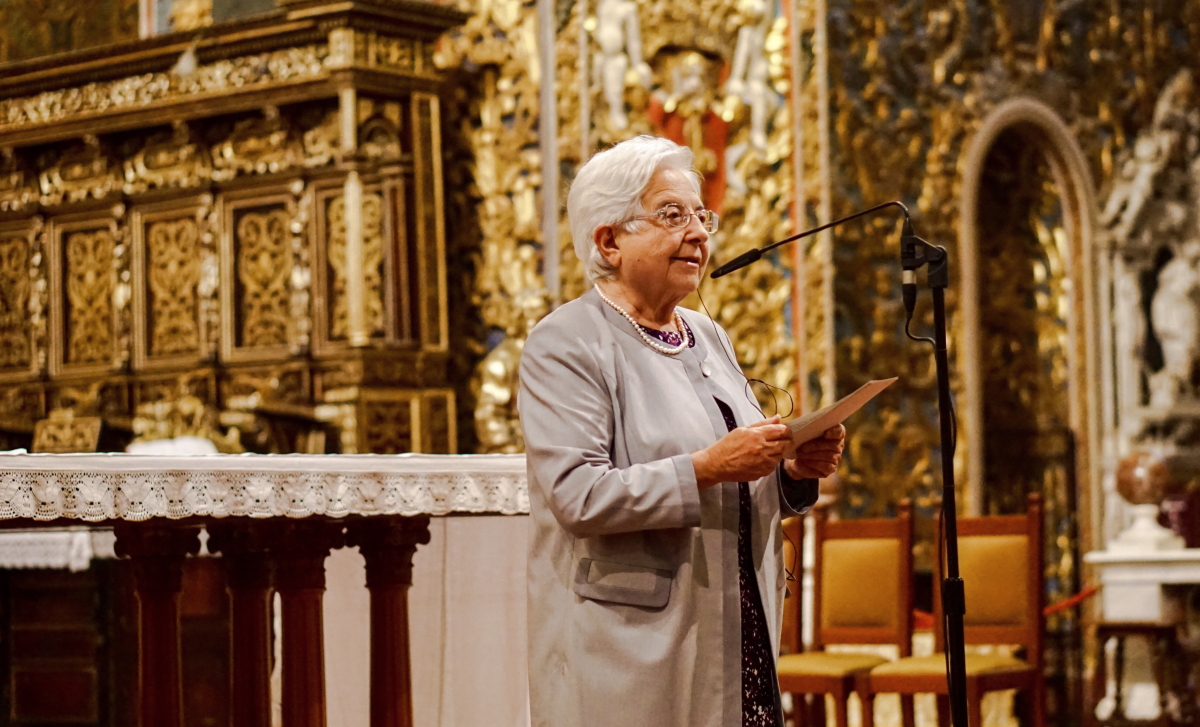 On the anniversary of that “community of peoples” that Schuman envisioned in 1950, proposing the historic coal and steel community to avoid all forms of war between France, Germany and any country who would later join the community, Maria Voce asked what the inspirational spark might have been behind such an extraordinary gesture that was intended to bring reconciliation to populations overwhelmed by the most horrible conflicts ever seen up until then. Who had inspired Schuman, Adenauer, De Gasperi – all Christian statesmen who are considered the founding fathers of Europe? The answer is obvious: “We want to think that the ideas and the strength to build Europe came from God who had shown his love for all people by suffering an infamous and atrocious death, God had identified with all the pains of humanity, including the ones deriving from violence and wars.”
On the anniversary of that “community of peoples” that Schuman envisioned in 1950, proposing the historic coal and steel community to avoid all forms of war between France, Germany and any country who would later join the community, Maria Voce asked what the inspirational spark might have been behind such an extraordinary gesture that was intended to bring reconciliation to populations overwhelmed by the most horrible conflicts ever seen up until then. Who had inspired Schuman, Adenauer, De Gasperi – all Christian statesmen who are considered the founding fathers of Europe? The answer is obvious: “We want to think that the ideas and the strength to build Europe came from God who had shown his love for all people by suffering an infamous and atrocious death, God had identified with all the pains of humanity, including the ones deriving from violence and wars.” 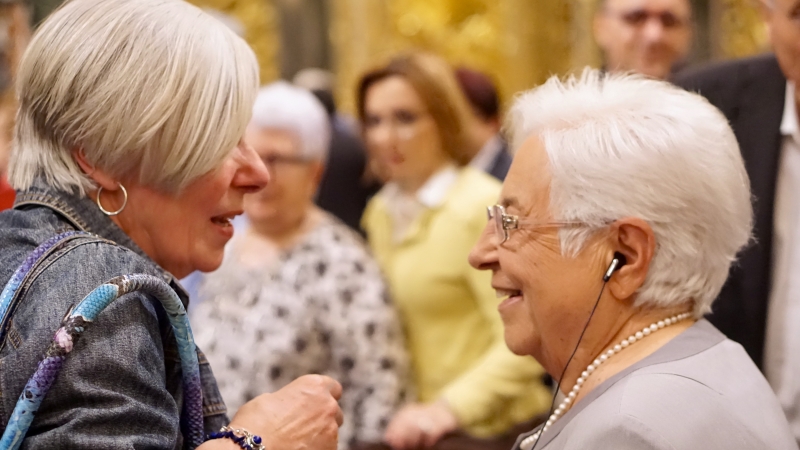 With regard to the culture that could emerge when there is profound reconciliation, Maria Voce quoted Chiara Lubich: “Every person can have a contribution to give – in any field: science, art, politics, communications, and so on. And they will be more efficacious if they work together with others who are united in the name of Christ: it is the continuation of the Incarnation and, it is in this way, that what could be called a culture of the Resurrection spreads through the world.” But for this to happen, “a path towards full and visible communion is asked of us, Christians, knowing that this will be decisive for the unity of Europe and for serving humanity better.” Recently, this path began to unfold further stages, in Lund, Sweden, Lesbos, Greece, and Cuba. “In a multi-cultural and multi-religious Europe there is need for a new capacity to dialogue, dialogue that can be based on the Golden Rule that is found in every religion on earth.” How significant to be saying these things precisely in the safe port of Malta in the midst of the Mediterranean, in the hope that this blue tomb will again become “Mare Nostrum” where Europe, Africa and the Middle East can find a peaceful route.
With regard to the culture that could emerge when there is profound reconciliation, Maria Voce quoted Chiara Lubich: “Every person can have a contribution to give – in any field: science, art, politics, communications, and so on. And they will be more efficacious if they work together with others who are united in the name of Christ: it is the continuation of the Incarnation and, it is in this way, that what could be called a culture of the Resurrection spreads through the world.” But for this to happen, “a path towards full and visible communion is asked of us, Christians, knowing that this will be decisive for the unity of Europe and for serving humanity better.” Recently, this path began to unfold further stages, in Lund, Sweden, Lesbos, Greece, and Cuba. “In a multi-cultural and multi-religious Europe there is need for a new capacity to dialogue, dialogue that can be based on the Golden Rule that is found in every religion on earth.” How significant to be saying these things precisely in the safe port of Malta in the midst of the Mediterranean, in the hope that this blue tomb will again become “Mare Nostrum” where Europe, Africa and the Middle East can find a peaceful route.
![Celebrating a Europe of Hope in Malta]()
9 May 2017 | Focolare Worldwide
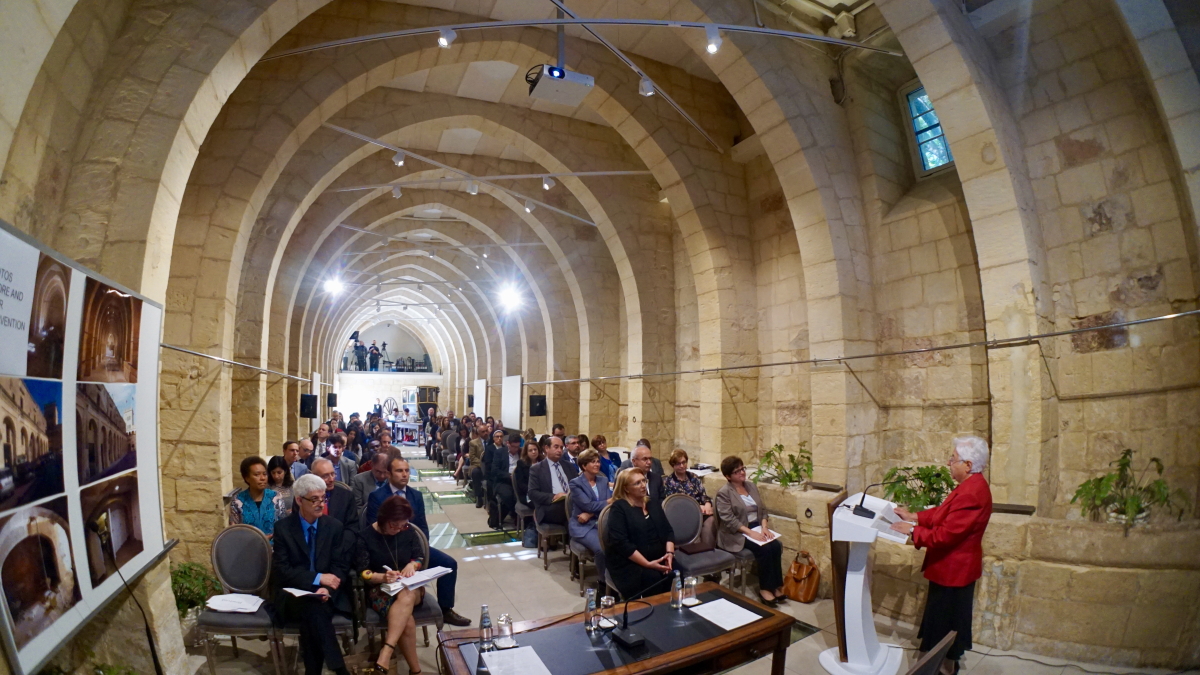 The visit (2-7 May) began with the participation on Monday, 2nd May, in the seminar promoted by “Communion and Law,” entitled, “Law as a means for integration in a multicultural society,” held in a meeting hall at the Presidential Palace, together with around 70 experts in the fields of immigration, education and employment. Among them were representatives of the Maltese Commission for refugees, representatives of the IOM and EASO Malta, Arnold Cassola, President of the Alternative Democratic Party (Alternattiva Demokratika), as well as law teachers and students. In her speech Maria Voce affirmed that the law can became an instrument for integration in society “if we overcome an exclusively formal vision, and focus on the concept of Law as an indispensable means for contributing to the creation of a reality of communion in society.” Citing the Together for Europe experience, born from an inspiration of Chiara Lubich, she talked about the actions that “appear like a prophetic sign of what Europe can become if its citizens will share more, the common experience that goes beyond the different cultures and ecclesiastical faiths,” and thus be a voice of “a Europe which, based on its own roots, opens out without fear to those who ask to be accepted and knows that the blend of peoples that have composed it for centuries can in turn blend with other peoples that will contribute to its development.” Each speech was backed by concrete initiatives, like the TANDEM project – presented by Apollos Pedro from Biafra, but a resident in Italy – which promotes peace and dialogue, giving people of different nationalities and religions the chance to live together.
The visit (2-7 May) began with the participation on Monday, 2nd May, in the seminar promoted by “Communion and Law,” entitled, “Law as a means for integration in a multicultural society,” held in a meeting hall at the Presidential Palace, together with around 70 experts in the fields of immigration, education and employment. Among them were representatives of the Maltese Commission for refugees, representatives of the IOM and EASO Malta, Arnold Cassola, President of the Alternative Democratic Party (Alternattiva Demokratika), as well as law teachers and students. In her speech Maria Voce affirmed that the law can became an instrument for integration in society “if we overcome an exclusively formal vision, and focus on the concept of Law as an indispensable means for contributing to the creation of a reality of communion in society.” Citing the Together for Europe experience, born from an inspiration of Chiara Lubich, she talked about the actions that “appear like a prophetic sign of what Europe can become if its citizens will share more, the common experience that goes beyond the different cultures and ecclesiastical faiths,” and thus be a voice of “a Europe which, based on its own roots, opens out without fear to those who ask to be accepted and knows that the blend of peoples that have composed it for centuries can in turn blend with other peoples that will contribute to its development.” Each speech was backed by concrete initiatives, like the TANDEM project – presented by Apollos Pedro from Biafra, but a resident in Italy – which promotes peace and dialogue, giving people of different nationalities and religions the chance to live together. 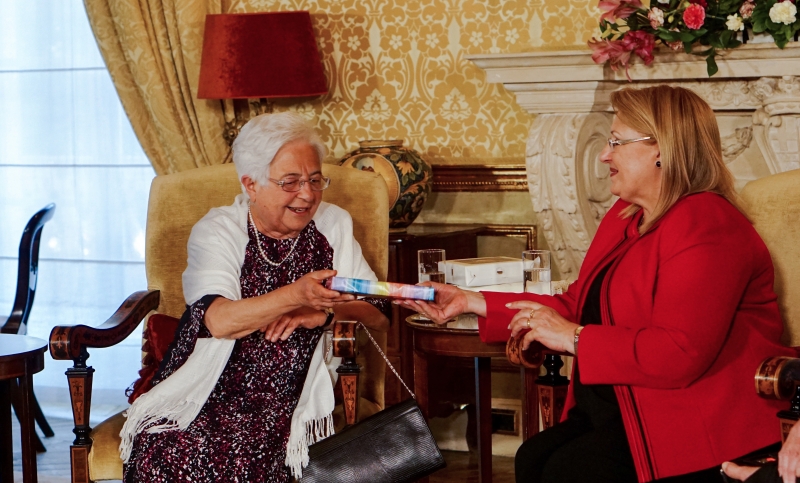 On 4th May, Maria Voce met with the President of the Republic of Malta, Marie-Louise Coleiro Preca, to whom she recounted the various branches of the Focolare Movement in Malta, and in particular the activities of New Humanity and the initiatives of the teenagers and young people. The President showed great interest and in the end, greeted the youth with a warm embrace. “The Focolare is like a vitamin boost. The art of loving is a precursor to positive peace in a world that is increasingly narcissistic and egocentric.” The children then presented her with the “Dice of love”. The Focolare President had been invited by the Malta Diocese, through its Ecumenical Commission, on the occasion of the 40th anniversary of its foundation. In this context, on 5th May, Maria Voce was received by the Archbishop C.J. Scicluna. Immediately afterwards, in the presence of 300 participants, she gave a conference on the topic “Dialogue or Dialogues – A Way of Life”.
On 4th May, Maria Voce met with the President of the Republic of Malta, Marie-Louise Coleiro Preca, to whom she recounted the various branches of the Focolare Movement in Malta, and in particular the activities of New Humanity and the initiatives of the teenagers and young people. The President showed great interest and in the end, greeted the youth with a warm embrace. “The Focolare is like a vitamin boost. The art of loving is a precursor to positive peace in a world that is increasingly narcissistic and egocentric.” The children then presented her with the “Dice of love”. The Focolare President had been invited by the Malta Diocese, through its Ecumenical Commission, on the occasion of the 40th anniversary of its foundation. In this context, on 5th May, Maria Voce was received by the Archbishop C.J. Scicluna. Immediately afterwards, in the presence of 300 participants, she gave a conference on the topic “Dialogue or Dialogues – A Way of Life”. 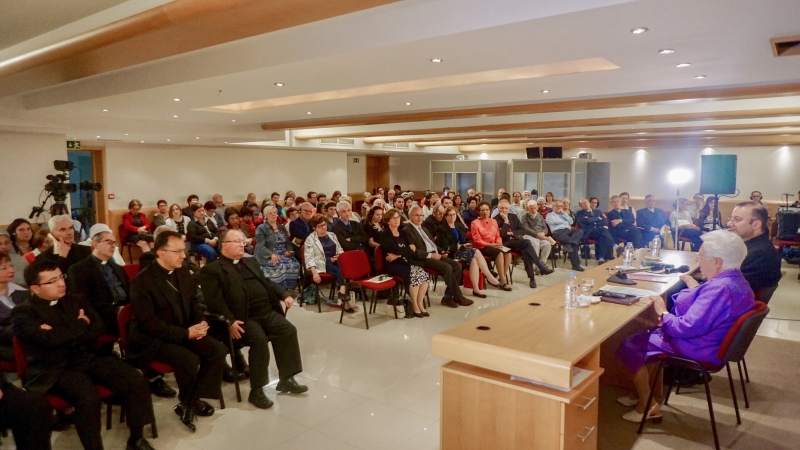 Also present were the Archbishop, the President of the Ecumenical Commission, the Vicar General, the Secretary of the Nunciature of Malta, the Nuncio of the Ivory Coast (of Maltese origin), a representative of the Romanian Orthodox Church, two members of the “Robert Schuman Centre for European Studies” and several members of ecclesial organisations. In tracing the rich history of the Movement’s ecumenical commitment, Maria Voce explained that the method of dialogue which Chiara Lubich promoted is love, “a dialogue between people, not between ideologies of systems of thought. She said that this must necessarily be supported and substantiated by mercy, compassion, and charity, summarised in the Golden Rule present in every culture and religion: Do to others whatever you wish others to do to you (Mt 7:12).” “The only way to ease the way to unity in truth is that of bowing before the others in the attitude of washing their feet (cf Jn 13) instead of telling them off. We need a lot of patience and humbleness.” Lastly, she presented the Ottmaring Declaration, published in Germany last 21 February, in which the Focolare Movement undertakes a greater ecumenical commitment. In the end, the Archbishop thanked Maria Voce for the work of the Focolare Movement in “arousing in people the thirst for unity.” He also recalled a phrase of Paul VI: “the world listens more to witnesses than to teachers.” Read about the Focolare in Malta
Also present were the Archbishop, the President of the Ecumenical Commission, the Vicar General, the Secretary of the Nunciature of Malta, the Nuncio of the Ivory Coast (of Maltese origin), a representative of the Romanian Orthodox Church, two members of the “Robert Schuman Centre for European Studies” and several members of ecclesial organisations. In tracing the rich history of the Movement’s ecumenical commitment, Maria Voce explained that the method of dialogue which Chiara Lubich promoted is love, “a dialogue between people, not between ideologies of systems of thought. She said that this must necessarily be supported and substantiated by mercy, compassion, and charity, summarised in the Golden Rule present in every culture and religion: Do to others whatever you wish others to do to you (Mt 7:12).” “The only way to ease the way to unity in truth is that of bowing before the others in the attitude of washing their feet (cf Jn 13) instead of telling them off. We need a lot of patience and humbleness.” Lastly, she presented the Ottmaring Declaration, published in Germany last 21 February, in which the Focolare Movement undertakes a greater ecumenical commitment. In the end, the Archbishop thanked Maria Voce for the work of the Focolare Movement in “arousing in people the thirst for unity.” He also recalled a phrase of Paul VI: “the world listens more to witnesses than to teachers.” Read about the Focolare in Malta
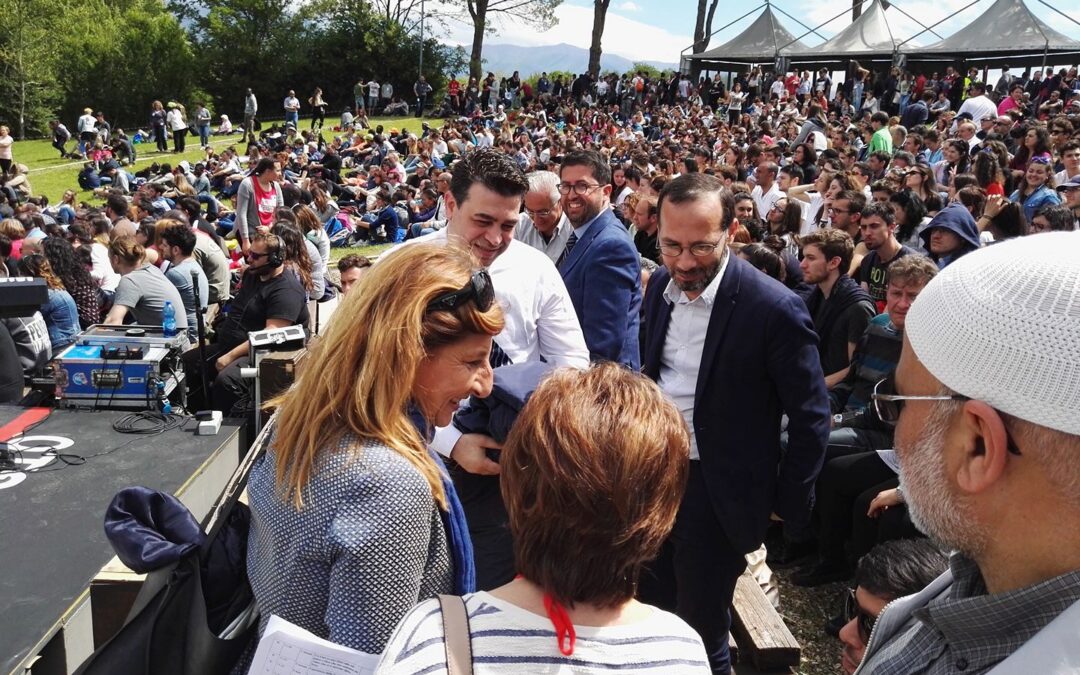
4 May 2017 | Focolare Worldwide
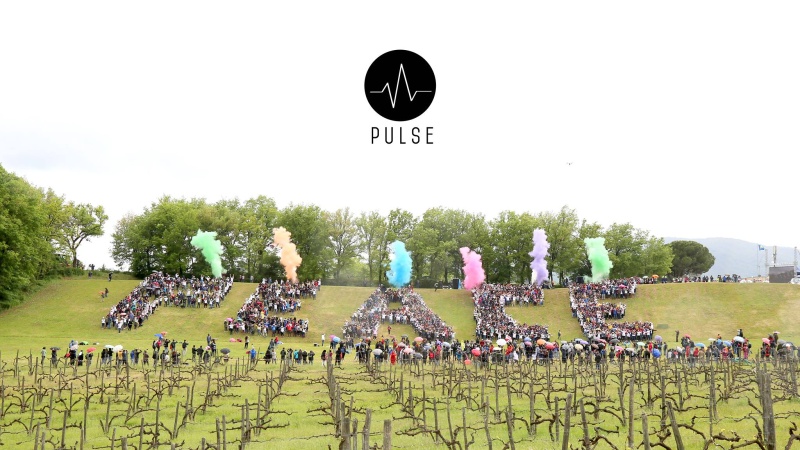 One image stood out, the word PEACE formed by the participants themselves on the front of a hill. One sound stood out, the sound of hand clapping to the same beat, a symbol of many hearts together in the boat of life where we are all migrant voyagers. On song for all, Hope is the eternal voice that guides us towards salvation. The annual appointment came to its symbolic end beneath an explosion of cannons loaded with colours – from green to fuchsia, on the first of May in Loppiano, at the International Meeting of Young People for a United World, during United World Week 2017, which was titled “Pulse: Change your heart, change the world.” Ever since 1973 when the first edition of the event was held in the small city of central Italy, a colourful crowd of crowd of thousands of young people from Italy, Europe and around the world have descended on Loppiano every May. It is a festive event that is like a model of living in peace with others, beginning from the young people, generations that are interconnected by nature and culture, and more inclined to putting up bridges rather than walls. Daily events included discussions, testimonies, music, dance, choreographies, all in the name of peace and the construction of a more united world, which has seen the commitment of the young people from t he Focolare Movement in collaboration with other associations and movements, such as New Horizons, the Community of San Egidio, La Pira International Centre, Living Peace, Robins, Barbiana, Economia disarmata, Il varco, and Non dalla guerra.There was a significant presence from the Muslim community of Italy, with support from the Imams of Massa Carrara, Teramo, Trieste and Veneto. The artistic quality was ensured thanks to the Gen Rosso and Gen Verde musical groups, DanceLab Cultural Harmony Associaton, singing performers Amara and Paolo Vallesi, who were on their way back from the Sanremo Musical Festival, and numerous other bands from different cities of Italy – all of them united by a strong desire for peace, and by the dream of a more inclusive world, more equal and fraternal. And that enthusiasm, not even the rain could wash away. While the greats of the world threaten new and ruinous acts of war, which are appalling to most, on the main stage of the natural amphitheatre of Loppiano, a series of stories “from below” were being proclaimed, real stories that if they were told enough times would change the course of history. Like the story of Mohamed, recounted by Luca, who had arrived in Italy in a boat after a dangerous crossing. Or like the story of a group of very young Christians from Syria who in a video message expressed their love for their martyred land. The forward gaze of the Harmony Dancelab Association was not a fake facade of pacifism, while it is holding Fine Arts workshops for children of the Palestinian territories with the help of Father Ibrahim Faltas from the Custody of the Holy Land.
One image stood out, the word PEACE formed by the participants themselves on the front of a hill. One sound stood out, the sound of hand clapping to the same beat, a symbol of many hearts together in the boat of life where we are all migrant voyagers. On song for all, Hope is the eternal voice that guides us towards salvation. The annual appointment came to its symbolic end beneath an explosion of cannons loaded with colours – from green to fuchsia, on the first of May in Loppiano, at the International Meeting of Young People for a United World, during United World Week 2017, which was titled “Pulse: Change your heart, change the world.” Ever since 1973 when the first edition of the event was held in the small city of central Italy, a colourful crowd of crowd of thousands of young people from Italy, Europe and around the world have descended on Loppiano every May. It is a festive event that is like a model of living in peace with others, beginning from the young people, generations that are interconnected by nature and culture, and more inclined to putting up bridges rather than walls. Daily events included discussions, testimonies, music, dance, choreographies, all in the name of peace and the construction of a more united world, which has seen the commitment of the young people from t he Focolare Movement in collaboration with other associations and movements, such as New Horizons, the Community of San Egidio, La Pira International Centre, Living Peace, Robins, Barbiana, Economia disarmata, Il varco, and Non dalla guerra.There was a significant presence from the Muslim community of Italy, with support from the Imams of Massa Carrara, Teramo, Trieste and Veneto. The artistic quality was ensured thanks to the Gen Rosso and Gen Verde musical groups, DanceLab Cultural Harmony Associaton, singing performers Amara and Paolo Vallesi, who were on their way back from the Sanremo Musical Festival, and numerous other bands from different cities of Italy – all of them united by a strong desire for peace, and by the dream of a more inclusive world, more equal and fraternal. And that enthusiasm, not even the rain could wash away. While the greats of the world threaten new and ruinous acts of war, which are appalling to most, on the main stage of the natural amphitheatre of Loppiano, a series of stories “from below” were being proclaimed, real stories that if they were told enough times would change the course of history. Like the story of Mohamed, recounted by Luca, who had arrived in Italy in a boat after a dangerous crossing. Or like the story of a group of very young Christians from Syria who in a video message expressed their love for their martyred land. The forward gaze of the Harmony Dancelab Association was not a fake facade of pacifism, while it is holding Fine Arts workshops for children of the Palestinian territories with the help of Father Ibrahim Faltas from the Custody of the Holy Land. 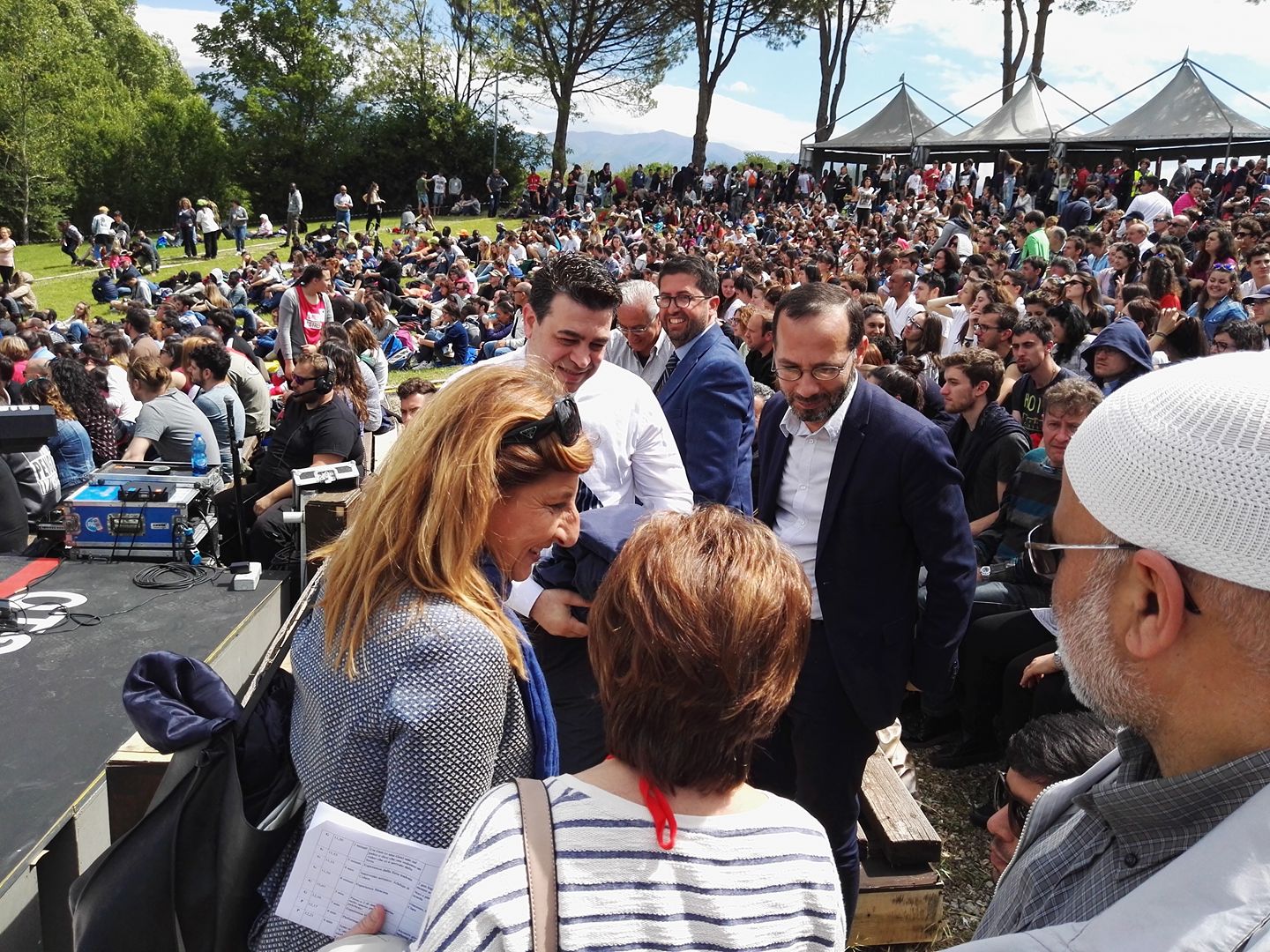 Heedless of all the rain, on the first afternoon, the young people began to trace the silhouette of a boat. Or perhaps the rain was precisely the missing detail, since the the journeys of today’s immigrants who are at the mercy of the waves in the hope of finding a peaceful and dignified future, are not void of threats and dangers. This is something that Giusi Nicolini, Mayor of Lambedusa, Italy and 2017 Peace Prize winner knows well. It’s raining on the hill as the message of peace is being formed, which is the theme of the musical piece by Amara and Paolo Vallesi, and it has become the theme of the day. But the brilliant colours exploding from un-warlike cannons, manage to overcome the grey clouds, the same colours that the young people gather from large sacks, before departing amidst a festive atmosphere. It represents the promise and commitment to “get their hands dirty” in bringing about a world of peace.
Heedless of all the rain, on the first afternoon, the young people began to trace the silhouette of a boat. Or perhaps the rain was precisely the missing detail, since the the journeys of today’s immigrants who are at the mercy of the waves in the hope of finding a peaceful and dignified future, are not void of threats and dangers. This is something that Giusi Nicolini, Mayor of Lambedusa, Italy and 2017 Peace Prize winner knows well. It’s raining on the hill as the message of peace is being formed, which is the theme of the musical piece by Amara and Paolo Vallesi, and it has become the theme of the day. But the brilliant colours exploding from un-warlike cannons, manage to overcome the grey clouds, the same colours that the young people gather from large sacks, before departing amidst a festive atmosphere. It represents the promise and commitment to “get their hands dirty” in bringing about a world of peace.
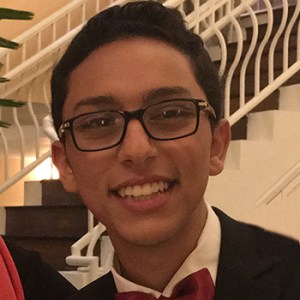
3 May 2017 | Focolare Worldwide, Senza categoria
 “May peace be with you,” Omar Abou Baker exhorts, who has been a peace ambassador since 2016 when the World Forum of Young People for Peace, held in Egypt, named him and 47 other young people between the ages of 8 and 23 ambassadors of peace. “I belong to the Heliopolis Choir of Cairo, which was begun for the sole purpose of spreading a culture of peace. Last year we organized a celebration for World Peace Day. This was the first time we presented ourselves to different embassies, explaining who we are and what our goal is. Through our shows we managed to convey to a vast audience that included ambassadors, actors, songs and famous people, our desire to build peace in our world.” During Ramadan, a sacred month for the Muslim world, when you fast from first light until sundown, the ambassadors organized dinners for 400 people in need. Everyone got to work using their own special talents: some got food, others presented songs, recitations, dances, games, face-painting for the children . . . But mostly we put our efforts into creating personal relationships. Together with other organizations we were able to hold a marathon for athletes with disabilities. Their lives represent a constant challenge. Each ambassador was responsible for one aspect of the event. The choir prepared songs to celebrate their feats; others worked on presentations, taking pictures or running particular events and workshops. On the National Day of Orphans the children sang in the choir with us. It was a meaningful experience for them, because by expressing themselves through music, they developed a bit more self confidence.” “I believe that peace is a very high concept that is attainable only if people make every effort possible to render it real. Because peace isn’t a word in an article or a lyric in a song. It’s a common effort that should be based on a whole series of values to be lived out by each and every one of us: justice, tolerance, helping others . . . The only way to actually build a world of peace and brotherhood is to put love into action. If I’m here today,” Omar concluded, “it’s to testify both with my word and with my life, that peace is possible if it begins from me.”
“May peace be with you,” Omar Abou Baker exhorts, who has been a peace ambassador since 2016 when the World Forum of Young People for Peace, held in Egypt, named him and 47 other young people between the ages of 8 and 23 ambassadors of peace. “I belong to the Heliopolis Choir of Cairo, which was begun for the sole purpose of spreading a culture of peace. Last year we organized a celebration for World Peace Day. This was the first time we presented ourselves to different embassies, explaining who we are and what our goal is. Through our shows we managed to convey to a vast audience that included ambassadors, actors, songs and famous people, our desire to build peace in our world.” During Ramadan, a sacred month for the Muslim world, when you fast from first light until sundown, the ambassadors organized dinners for 400 people in need. Everyone got to work using their own special talents: some got food, others presented songs, recitations, dances, games, face-painting for the children . . . But mostly we put our efforts into creating personal relationships. Together with other organizations we were able to hold a marathon for athletes with disabilities. Their lives represent a constant challenge. Each ambassador was responsible for one aspect of the event. The choir prepared songs to celebrate their feats; others worked on presentations, taking pictures or running particular events and workshops. On the National Day of Orphans the children sang in the choir with us. It was a meaningful experience for them, because by expressing themselves through music, they developed a bit more self confidence.” “I believe that peace is a very high concept that is attainable only if people make every effort possible to render it real. Because peace isn’t a word in an article or a lyric in a song. It’s a common effort that should be based on a whole series of values to be lived out by each and every one of us: justice, tolerance, helping others . . . The only way to actually build a world of peace and brotherhood is to put love into action. If I’m here today,” Omar concluded, “it’s to testify both with my word and with my life, that peace is possible if it begins from me.”
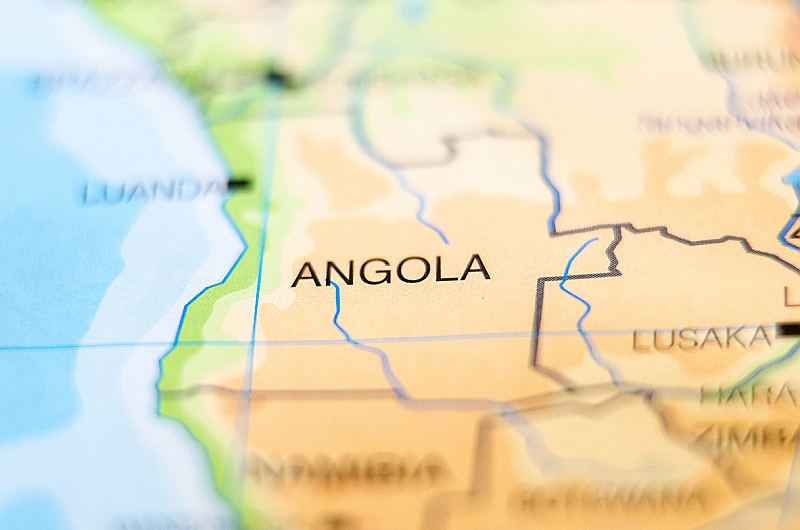
1 May 2017 | Focolare Worldwide
 “My brother was born on 12 March 1995 in a city of Bié, south of Angola. He was a cheerful child, loved nature, and enjoyed climbing trees, gathering their fruit and bringing them to others. He had been lively and active since he was a child and had started to work. At the age of 15 he had started to reach his objectives. Not wanting to weigh on his parents, he started working as an assistant bricklayer, and then at 16, as a motorcycle and bicycle mechanic. He dreamt of becoming a doctor to help people, like our dad. Yes, this story is about my brother. Two years ago, he went to the sea with three of his friends. On their way home they were surprised by some policemen. In those days there was a big tension in the city, and a lot of violence. To prevent it, the police had set a curfew: all those who were out and about after 6 pm were arrested. It was a way of frightening criminals and assuring the population. Most of the people, however, had not been informed of this decision, and it was the first curfew day. Among these were my brother and his friend, who found themselves simply in the wrong place at the wrong time. My brother, mistaken for a criminal, was arrested. Time passed and he had not returned home. Anguished we went to search for him everywhere: in the house of our relatives, hospitals, prisons, and at the beach where he had gone. But nobody had any clue as to my brother’s whereabouts. In the end, an uncle proposed looking in the last place we would have ever wanted to go: the orbituary. His body was there. He was only 20 and with all the future before him. It was a really difficult moment, an immense suffering for our family. From the signs on his body it was clear that the policemen had been very cruel and he had suffered greatly before dying. This tragedy provoked a deep crisis, especially in my father. He had chosen to work to save human lives, and now before him was the drama of a son he was unable to help…. I knew the spirituality of the Focolare Movement for a long time, and tried to put the Gospel into practice. In giving myself to the others I had found my fulfillment, but with my brother’s death, a sentiment of hatred grew in me towards the policemen who had done this atrocity. The pain dug an unbridgeable void deep inside me. It was a long internal trial: in the depth of my heart, in fact, I wanted to start a process towards forgiveness. It wasn’t easy. Only God could fill this void and make my heart capable of mercy. In this path, the love of the Focolare community in my city was fundamental. I felt loved, welcomed and helped by all. I thus found the strength within me to make this choice. I have rediscovered the gift of peace, by building it firstly inside me, up to the point of looking at every policeman with my eyes and heart full of mercy.”
“My brother was born on 12 March 1995 in a city of Bié, south of Angola. He was a cheerful child, loved nature, and enjoyed climbing trees, gathering their fruit and bringing them to others. He had been lively and active since he was a child and had started to work. At the age of 15 he had started to reach his objectives. Not wanting to weigh on his parents, he started working as an assistant bricklayer, and then at 16, as a motorcycle and bicycle mechanic. He dreamt of becoming a doctor to help people, like our dad. Yes, this story is about my brother. Two years ago, he went to the sea with three of his friends. On their way home they were surprised by some policemen. In those days there was a big tension in the city, and a lot of violence. To prevent it, the police had set a curfew: all those who were out and about after 6 pm were arrested. It was a way of frightening criminals and assuring the population. Most of the people, however, had not been informed of this decision, and it was the first curfew day. Among these were my brother and his friend, who found themselves simply in the wrong place at the wrong time. My brother, mistaken for a criminal, was arrested. Time passed and he had not returned home. Anguished we went to search for him everywhere: in the house of our relatives, hospitals, prisons, and at the beach where he had gone. But nobody had any clue as to my brother’s whereabouts. In the end, an uncle proposed looking in the last place we would have ever wanted to go: the orbituary. His body was there. He was only 20 and with all the future before him. It was a really difficult moment, an immense suffering for our family. From the signs on his body it was clear that the policemen had been very cruel and he had suffered greatly before dying. This tragedy provoked a deep crisis, especially in my father. He had chosen to work to save human lives, and now before him was the drama of a son he was unable to help…. I knew the spirituality of the Focolare Movement for a long time, and tried to put the Gospel into practice. In giving myself to the others I had found my fulfillment, but with my brother’s death, a sentiment of hatred grew in me towards the policemen who had done this atrocity. The pain dug an unbridgeable void deep inside me. It was a long internal trial: in the depth of my heart, in fact, I wanted to start a process towards forgiveness. It wasn’t easy. Only God could fill this void and make my heart capable of mercy. In this path, the love of the Focolare community in my city was fundamental. I felt loved, welcomed and helped by all. I thus found the strength within me to make this choice. I have rediscovered the gift of peace, by building it firstly inside me, up to the point of looking at every policeman with my eyes and heart full of mercy.”

 “We asked the mayor of Savignano sul Rubicone to send a message of fraternity by adding some color to a public space,” say Matteo and Giosuè, Italian members of Youth for a United World. “They gave us an underpass connecting the main road to the train station. We created a mural where we wrote, next to the bridge that symbolizes the city, ‘Let’s bridge’ and “Global citizens” in a number of languages, with the help of a number of migrant kids who came through.” The result was a collective work, a visible sign of peace. The mural project was also an opportunity to make contact with the head of the Ravenna mosque, Imam Mustapha Soufi (president of the European Islamic Conference of Imams). After three months of work the underpass was inaugurated with two mayors and a member of European Parliament who, just three days after the terrible events in Brussels (this was March 2016), had asked to participate in this type of project, one promoted by kids that instils hope in a peaceful future. The underpass became a symbolic place. Matteo and Giosuè are both “ambassadors of peace,” an honorary title bestowed on them by Universal Circle of Ambassadors of Peace, headquartered in Geneva, which has the goal of spotlighting all those who work for peace, especially young people and children ages 6 to 18. For a number of years, they have organized a spring fair in their region, together with other young people. This is a Young for Unity project that, in collaboration with schools, associations and local governments, hopes to create activities promoting peace and fraternity. “Last July,” continues Matteo, “together with 50 members of Young for Unity, we went to World Youth Day. Pope Francis concluded his words with ‘May God bless your dreams.’ There are so many dreams that we want to achieve, especially to be builders of a world of peace and fraternity.” After an earthquake struck central Italy, they felt called once again. Among the many ideas was one to put on two dinners in Modena and Cesena to raise funds. “We got close to 100 kids involved and served 350 people at table, raising more than 4,000 Euros.” The dinner at Cesena included Imam Mustapha, who asked them to come and meet young Muslims to start on a path for peace at the Ravenna mosque, one of the four official mosques in Italy. They were warmly welcomed on January 22. They took off their shoes as they entered, and the girls covered their heads. They sat in a circle, girls to one side, boys to the other. “We started playing a quiz game on the Bible and Quran – there are so many things in common. We are not so different, and all of us wanted to build a more united world. At noon we stood up and, holding hands, we had a minute of silence to ask God for the gift of peace.” After a meal of cous cous prepared by the Muslim mothers, the group had a guided tour of the mosque and a moment of dialogue. “Peace is made by the young,” says the imam, “we must unite and change our way of thinking in order to bring down the walls of prejudice.” Their Muslim friends asked to be able to visit a Catholic church next. “It feels fantastic,” concludes Giosuè. “To build peace we need to respect each other and not be afraid of differences. How can we not think of those Muslim kids that we meet at school or perhaps come across on the street? They too are our brothers, builders of peace together with us, and not terrorists like the media wants us to believe.”
“We asked the mayor of Savignano sul Rubicone to send a message of fraternity by adding some color to a public space,” say Matteo and Giosuè, Italian members of Youth for a United World. “They gave us an underpass connecting the main road to the train station. We created a mural where we wrote, next to the bridge that symbolizes the city, ‘Let’s bridge’ and “Global citizens” in a number of languages, with the help of a number of migrant kids who came through.” The result was a collective work, a visible sign of peace. The mural project was also an opportunity to make contact with the head of the Ravenna mosque, Imam Mustapha Soufi (president of the European Islamic Conference of Imams). After three months of work the underpass was inaugurated with two mayors and a member of European Parliament who, just three days after the terrible events in Brussels (this was March 2016), had asked to participate in this type of project, one promoted by kids that instils hope in a peaceful future. The underpass became a symbolic place. Matteo and Giosuè are both “ambassadors of peace,” an honorary title bestowed on them by Universal Circle of Ambassadors of Peace, headquartered in Geneva, which has the goal of spotlighting all those who work for peace, especially young people and children ages 6 to 18. For a number of years, they have organized a spring fair in their region, together with other young people. This is a Young for Unity project that, in collaboration with schools, associations and local governments, hopes to create activities promoting peace and fraternity. “Last July,” continues Matteo, “together with 50 members of Young for Unity, we went to World Youth Day. Pope Francis concluded his words with ‘May God bless your dreams.’ There are so many dreams that we want to achieve, especially to be builders of a world of peace and fraternity.” After an earthquake struck central Italy, they felt called once again. Among the many ideas was one to put on two dinners in Modena and Cesena to raise funds. “We got close to 100 kids involved and served 350 people at table, raising more than 4,000 Euros.” The dinner at Cesena included Imam Mustapha, who asked them to come and meet young Muslims to start on a path for peace at the Ravenna mosque, one of the four official mosques in Italy. They were warmly welcomed on January 22. They took off their shoes as they entered, and the girls covered their heads. They sat in a circle, girls to one side, boys to the other. “We started playing a quiz game on the Bible and Quran – there are so many things in common. We are not so different, and all of us wanted to build a more united world. At noon we stood up and, holding hands, we had a minute of silence to ask God for the gift of peace.” After a meal of cous cous prepared by the Muslim mothers, the group had a guided tour of the mosque and a moment of dialogue. “Peace is made by the young,” says the imam, “we must unite and change our way of thinking in order to bring down the walls of prejudice.” Their Muslim friends asked to be able to visit a Catholic church next. “It feels fantastic,” concludes Giosuè. “To build peace we need to respect each other and not be afraid of differences. How can we not think of those Muslim kids that we meet at school or perhaps come across on the street? They too are our brothers, builders of peace together with us, and not terrorists like the media wants us to believe.”


 With regard to the culture that could emerge when there is profound reconciliation, Maria Voce quoted
With regard to the culture that could emerge when there is profound reconciliation, Maria Voce quoted 
 On 4th May, Maria Voce met with the President of the Republic of Malta,
On 4th May, Maria Voce met with the President of the Republic of Malta,  Also present were the Archbishop, the President of the Ecumenical Commission, the Vicar General, the Secretary of the Nunciature of Malta, the Nuncio of the Ivory Coast (of Maltese origin), a representative of the Romanian Orthodox Church, two members of the “Robert Schuman Centre for European Studies” and several members of ecclesial organisations. In tracing the rich history of the
Also present were the Archbishop, the President of the Ecumenical Commission, the Vicar General, the Secretary of the Nunciature of Malta, the Nuncio of the Ivory Coast (of Maltese origin), a representative of the Romanian Orthodox Church, two members of the “Robert Schuman Centre for European Studies” and several members of ecclesial organisations. In tracing the rich history of the 



